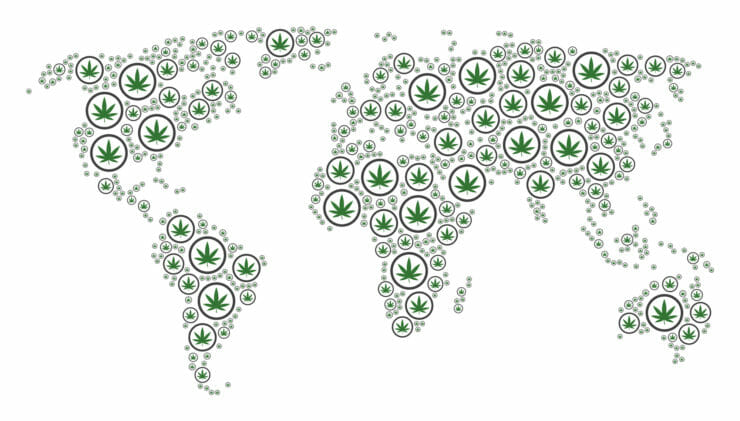Yesterday, I came across an article in this week’s Economist titled Going to Pot (*sigh*). The premise of this article is that “a global revolution in attitudes towards cannabis is under way” and it explains how countries in many parts of the world have begun to undertake cannabis reforms in varying degrees. This includes everything from wholesale federal legalization (i.e. Canada, Uruguay) to emerging medical cannabis programs (e.g. South Korea, Germany, Thailand, Zimbabwe). The article covers what these changes mean in a commercial sense, but also their implications under international law.
The global reconsideration of cannabis is a recent phenomenon, but only relatively. In August of last year, I explained that the United Nations (UN) itself had finally begun to reconsider the status of cannabis under international law, including under the Single Convention on Narcotic Drugs of 1961 and related treaties (“Single Convention”). I also analyzed, this February, the significant and long overdue World Health Organization recommendations related to the treatment of cannabis under international law. What the UN does with those recommendations is still an open question, but in a certain sense it doesn’t matter: countries are moving ahead.
In keeping with these changes, our law firm has begun doing more and more international advising with respect to cannabis in the last few years. Broadly, we divide this work into three classes:
- Importers and exporters of hemp (We have clients doing this. There are no real treaty issues; it’s more about domestic law and customs);
- Importers and exporters of medical cannabis (We have clients looking at this. Treaty issues are generally navigable, given the Single Convention allowances on “medical and scientific” cannabis);
- Fully legalized jurisdictions, à la Canada (We represent one sovereign looking at this. It is “illegal” and really interesting).
So what happens under international law when a country legalizes cannabis outright? As a practical matter, not much. Public international law is decentralized, unenforceable, unpoliced and frequently broken. This means that neither Canada nor Uruguay will be hauled before a court or tribunal for admitted violations of the Single Convention. The same will be true of Mexico when it legalizes cannabis later this year. Same for Luxembourg. And Switzerland. Etc. At most, these states will be subject to diplomatic moralizing and criticism, mostly out of sight.
That isn’t to say that states do not have options with respect to the Single Convention and cannabis. Below are three that are commonly discussed.
Withdraw from the Treaties
Under international law, a state may withdraw from a treaty in conformance with the provisions of the treaty itself (if the agreement permits withdrawal) or with the consent of all parties. The Single Convention permits withdrawal, at Article 46. And there is precedent for withdrawal: Bolivia withdrew from the Single Convention in 2012 when it wanted to legalize the chewing of coca leaves. It then rejoined with a “reservation” as to coca leaves in 2013.
In the context of cannabis, Canada seems to have discussed the withdrawal option in detail. Ultimately, it appears that Canada will not withdraw, on the reasoning that its contravention of the treaty is principled (cannabis prohibition is harmful), and that withdrawal would be an excessive response given all the other drugs included in the Single Convention. That may seem unconvincing, but options here are few.
Inter se Agreement
Canada and other scofflaws could also form an “inter se” (between themselves) agreement, allowing those states to modify existing drug treaty obligations with respect to cannabis.
The inter se option is wonky territory, even for international law. Based in Article 41 of the 1969 Vienna Convention on the Law of Treaties, it was designed to allow changes without consensus while supporting stable treaty regimes. This option would require that the inter se agreement include a clear commitment to the Single Convention’s original aim; that is, to promote the health and welfare of humankind (as to cannabis, here) and to maintain the original treaty obligations vis-à-vis countries left behind. That doesn’t seem terribly challenging.
So, will an inter se agreement happen anytime soon in the context of cannabis? Probably not, for the simple reason that not enough countries have legalized cannabis outright to create a major constituency. Check back in ten years.
Violate International Law
This is what countries have begun to do, and will continue to do, to the point where the Single Convention is broadly undermined. The scenario is roughly analogous to what U.S. states have done to the domestic Controlled Substances Act as to “marijuana.” It will be an even slower process, however, given the prohibitionist posture of global heavies like China and Russia on cannabis, and the glacial development of international law generally. It will take decades and decades, in fact.
The Economist is correct that a global revolution in attitudes towards cannabis is under way. The revolution of laws, however, will be slower. Until then, and as the poet once said, “to live outside the law you must be honest.” Canada, Uruguay and every other country making a move on cannabis knows exactly how that feels.
























